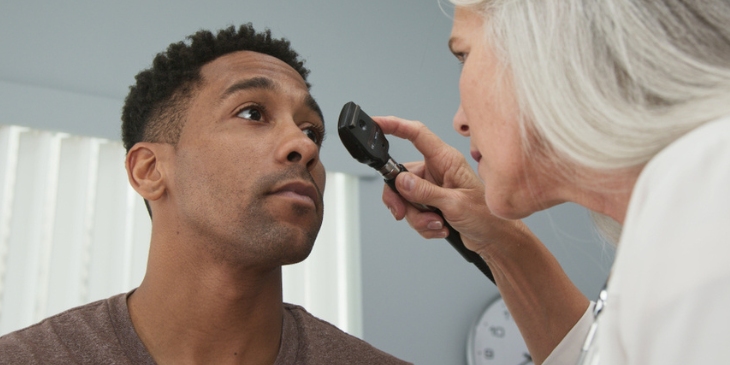An Eye Exam Could Save Your Life
Visiting the ophthalmologist every year is good for your eyes and your overall health. In fact, eye exams can reveal changes in your eyes that could be related to serious, undiagnosed health conditions.
Why Eye Exams Are So Important For Your Health
Diseases and conditions don’t always cause illness, pain or immediate changes in your health. Although you may feel fine, your disease or condition could be slowly damaging your health. Fortunately, early signs of illnesses can often be detected in the eyes before you notice any changes in your health.
Could You Have High Blood Pressure or High Cholesterol? The Proof May Be in Your Eyes
Uncontrolled high blood pressure damages your blood vessels, increasing your risk of heart attack, heart disease, stroke, blood clots, kidney disease, dementia and other serious conditions. Despite the damage taking place inside your body, you may not realize anything’s wrong unless your visit your ophthalmologist for a checkup.
If you have high blood pressure, your eye doctor may notice changes in the arteries or veins in your retinas during an exam. The retina, located at the back of the eye, is responsible for converting light rays to electrical impulses and sending them to the brain.
Low-density lipoprotein (LPL) protein, commonly called the “bad” type of cholesterol, can spell trouble for your health. High cholesterol causes a buildup of waxy plaque in your arteries, limiting blood flow and increasing your stroke risk. The trouble starts when a small piece of plaque breaks off and travels to your heart or brain, triggering a partial or complete blockage that could cause a heart attack or stroke.
Signs of high cholesterol in the eyes include:
- Bumpy Eyelids. Xanthelasma (yellow bumps on the eyelid) form when your bad cholesterol level is too high.
- Arcus Senilis. A blue, gray or white ring around your cornea could also be a sign of high cholesterol. The ring, known as arcus senilis, develops at the edge of the cornea, the clear tissue that covers your iris and pupil. Arcus senilis isn’t a cause for concern in middle-aged or older people, according to the American Academy of Ophthalmology, but could be a sign of high cholesterol in younger people.
Your Eyes Could Offer Clues About Your Stroke Risk
Central retinal occlusion, or “eye strokes” occur when an artery in your eye becomes blocked. Your doctor can see the blocked artery when he dilates your eyes during a comprehensive eye exam. The condition often causes some degree of vision loss but could be overlooked if you’re already having problems with your vision.
According to the American Heart Association, your stroke risk may increase once you’ve had a central retinal occlusion. The American Academy of Ophthalmology notes that small scar on your retina could be a sign that you’ve had an eye stroke in the past.
Signs of Diabetes May First Appear in the Eyes
The Centers for Disease Control and Prevention estimates that 23% of Americans have diabetes but don’t realize it. Diabetes happens when your blood sugar is too high. Over time, high blood sugar can cause kidney damage, heart disease, nerve damage, stroke, and vision loss.
Blood vessels in the retina may leak due to a condition called diabetic retinopathy. At the same time, abnormal vessels may also form and leak blood or fluid. Swelling of the macula, the center part of the retina, can also be a sign that you have diabetes.
Some Eye Issues Can Be Caused by Cancer
Cancer can interfere with your immune system and affect your body’s ability to find and kill germs, increasing your risk for eye infections. Your eye doctor may suspect some type of cancer if you have frequent eye infections, bleeding in the back of the eye, a dark spot on your eye, a growth on your eyelid or problems with the optic nerve, the pathway from the eyes to the brain.
Of course, these problems can happen for many other reasons and don’t necessarily mean that you have cancer. If your ophthalmologist does notice anything suspicious, you’ll be referred to the appropriate specialist.
Yearly eye exams offer a simple way to protect your health and your eyes. Contact our office to schedule your exam.
Sources:
American Heart Association: Stroke Affecting the Eye Requires Immediate Treatment, Can Signal Future Vascular Events, 3/8/2021
Centers for Disease Control and Prevention: National Diabetes Statistics Report, 6/29/2022
https://www.cdc.gov/diabetes/data/statistics-report/index.html
American Academy of Ophthalmology: Early Signs of Heart Disease Appear in the Eyes, 4/27/2022
https://www.aao.org/eye-health/news/eye-stroke-heart-disease-vision-exam-retina-oct
Cleveland Clinic: Xanthelasma, 6/25/2022
https://my.clevelandclinic.org/health/diseases/23385-xanthelasma
American Academy of Ophthalmology: What Is Arcus Senilis?, 4/26/2019
https://www.aao.org/eye-health/diseases/what-is-arcus-senilis
CNN: These Health Problems Can Be Predicted with a Look into Your Eyes, 3/1/18
https://www.cnn.com/2018/02/28/health/retina-memory-loss-study/index.html

